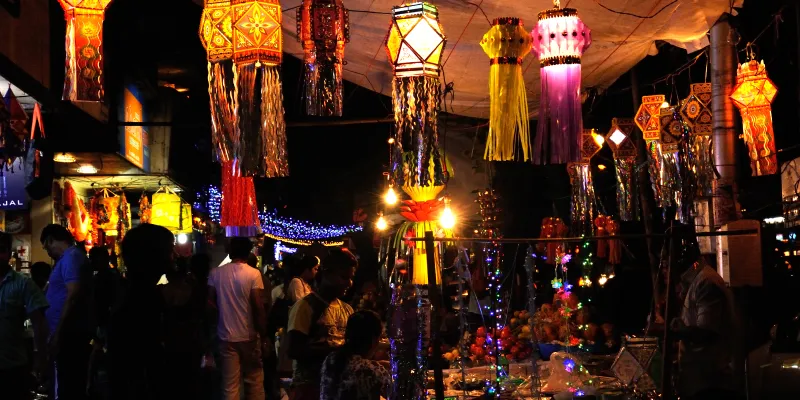Will Diwali shopping help bailout MSMEs from the impact of COVID-19?
As the country gears up for Diwali, will the festive season bring hope to small business owners who have been striving with all their might to survive the COVID-19 crisis?
The year 2020 would be unforgettable for Indian micro, small and medium enterprises (MSMEs).
India’s MSME sector — which houses about 70 million enterprises and employs around 110 million people — is one of the worst affected due to the disruption caused by the lockdown. With factories shutting down, freeze in production and disruption in supply chains, small businesses have been facing the heat of the coronavirus pandemic.
Moreover, MSMEs’ sizable contribution to the GDP and exports, which is around 30 percent and 45 percent respectively, is another reason why the Indian economy is feeling the burden of several MSMEs toppled because of the pandemic.
As the country gears up for Diwali, will the festive season bring hope into the lives of the small business owners who have been striving with all their might to survive such a crisis?
A deserted season for shopkeepers
Deepak Gupta is the owner of Deepak Store, a kirana store in Delhi’s IP Extension area. While his grocery sales went up by large margins during the pandemic, the gifting vertical which sells items during Diwali has been hit hard.
Till last year, Deepak says that about 100-150 customers would visit his shop every day during Diwali. This year, only 50-60 customers come in a day. “This year the sales are down by 50 percent,” he complaints. Gift boxes at Deepak’s shop majorly lay unattended, except the occasional buy when a customer pays a visit.
The picture painted by Deepak stands at a sharp contrast to another being circulated on social media since the last few days which depicts people bustling through Delhi’s popular flea market, Sarojini Nagar. The scene would make anyone wonder if the pandemic is over. Unfortunately, all coronavirus-related warnings, including maintaining social distance, seem to have gone for a toss.
In hindsight, it would also give the impression that people are going all-out. Several areas in and around Delhi markets are seen attracting huge crowds.
Manish Gupta, General Secretary of Market Welfare Association, Shahdara, clarifies that markets are crowded but people are mostly window shopping and the number of actual buyers is very few. Another reason why the coronavirus pandemic has been catastrophic for India is the widespread job losses which have brought down disposable incomes. He quips, “People are spending their money very carefully.”
Sudhir Jha, Vice President of MSME Development Forum and General Secretary of All India Confederation of Small and Micro Industries Association (AICOSMIA), says that people indulging in retail therapy is not surprising. “After being captivated for months at a stretch, they seem to have let their guard down,” he adds.
Manish is concerned and worried about shopkeepers. “The market goes empty after Diwali, but this time, the markets are empty even during Diwali”. He illustrates that even gifting companies, including some bigger brands, are sending limited stocks, with the prices the same as that of last year. Sudhir responds to this trend by asking, “When the demand is less, for whom will the companies manufacture? Who will buy their products?”
This year, political sentiments have also taken over the buyers and sellers. As the voices around Aatmanirbhar Bharat, Vocal for Local, and Made-in-India have become louder, and anti-China sentiments seem to have set in, the same is reflected in the buying behaviour of consumers. Sunita Sharma* (name changed), a teacher, says that this year, she will not buy any Diwali lights and use the ones that she has kept from previous years. “Because of COVID-19, we are not really stepping out. Also, from this year onwards, we will not buy lights that are made in China,” she says.
Dheeraj* (name changed) runs a small electronic shop which also sells Diwali lights.
Talking about the source of the products he sells, he says, “Around 70 percent of the products come from China whereas 30 percent are made in India.” He also added that people have become wary of buying Chinese goods but the supply of Indian goods is insufficient.
Dheeraj said he is ready to sell only Made in India products provided there is adequate supply.

Online sellers have reasons to rejoice
While the mood among offline shopkeepers is dark and grim, the sentiments are exactly the opposite in the case of small business owners who are selling online. MSMEs that are listed on ecommerce platforms or are selling through their own website are not as adversely affected.
Ravi Saxena, Managing Director of Wonderchef, tells SMBStory that Wonderchef is betting on the online space.
He says, “Our online sales have been quite encouraging. Our stores were closed during the lockdown but we received orders through our website and ecommerce platforms. Online sales have helped us sustain in this difficult phase.”
Last year, Wonderchef clocked Rs 80 crore worth sales during the festive season. This year, thanks to online channels, it is expecting sales to touch Rs 120 crore.
Marketplaces such as Amazon have also raised their banners when it comes to supporting MSMEs. According to data released by the ecommerce giant, this year saw a 142 percent increase in the number of MSMEs making an account on Amazon Business during the Great Indian Festival. In addition, the number of business purchases on Amazon Business saw a 61 percent spike — the largest ever.
Amit Kabra, Business Partner of Vibgyor Vibes, sells toys through Cloudtail. The company does not have any offline presence. Amit says that he has seen no impact in sales, and rather, there is a 3x increase in sales from last year.
Amit has a different take in the context of job losses leading to lower demand. He says, “We are unaffected because most of our customers belong to white-collar jobs and are working from home. They are spending more time with their kids and are buying toys.”
However, he adds that the most sold-out toys fall in the average ticket size of Rs 350-400, which is lower.
Even bigger brands such as Mondelez are leaning on the direct-to-consumer (D2C) business model to tide over the crisis. Anil Viswanathan, Senior Director, Marketing (Chocolates), Insights and Analytics, Mondelez India, says that whether there is a pandemic or not, they will continue serving customers to ensure that celebrations are not halted, “We have reconfigured our offerings to suit the new norms, whether it is expanding our gifting portfolio with different SKUs and brands or accelerating our efforts in the ecommerce space while complimenting it with focused marketing strategies. We are also strengthening our distribution network – expanding and adding one lakh stores to our on-ground ecosystem and offering personalised and digital shopping opportunities through our D2C website, which making records when it comes to the number of orders per day.”
Becoming fundamentally resilient
While going online seems to have become the norm since most of the brands are riding on the D2C wave, Sudhir points out that it is not possible for all MSMEs to suddenly go online.
“Micro enterprises comprise the largest number of MSMEs. They operate locally. It is not possible for everyone to go online despite the benefits they offer. We need conducive financial schemes for MSMEs to make them more resilient.”
Manish and Deepak say that they don’t expect relief in filing for the goods and services tax (GST). Over the last few months, the government has been working towards providing some relief to this sector. The Rs 3 lakh-crore collateral-free loan in the Aatmanirbhar Bharat Stimulus package being the biggest example. All eyes are now on the new tranche of the stimulus package which was announced by Finance Minister Nirmala Sitharaman yesterday.
Edited by Kanishk Singh








